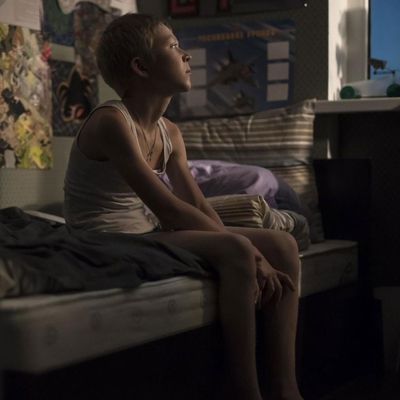
This review originally ran during the Cannes Film Festival.
If, in these unstable times, you were tempted to wonder about how things are going in Putin’s Russia, Loveless might offer some extremely cold comfort. Leviathan director Andrey Zvyagintsev has reunited with writer Oleg Negin for another dour look at his home country, this time revolving around the disappearance of the child of a deeply unhappy couple. It’s a traumatizing incident made worse by how unceasingly terrible everyone involved is, with the possible exception of the police. Zvyagintsev’s film lives up to its name, but it’s hard to suss out what it’s a condemnation of, exactly: conservative orthodoxy, bikini waxes, and selfies are all targets at different points. Women in particular can’t seem to do anything right.
Alyosha (Matvey Novikov) is the son of Zhenya (Maryana Spivak) and Boris (Aleksey Rozin), a couple in the midst of a bitter divorce. Boris had an affair with a younger woman and got her pregnant, but it seems Zhenya was never terribly enthusiastic about the relationship to begin with — and besides, she has her own new lover, a wealthy bachelor. It’s implied that Alyosha goes missing when both parents are out of the house having sex with their new partners. In the post-coital gloom of her boyfriend’s bedroom, Zhenya tells the story of how she and Boris got together in the first place, how she didn’t want her pregnancy, and how she hated her son so much when he was born she didn’t produce milk. She asks her boyfriend if she’s a monster. “The most beautiful monster in the world,” he replies. Okay.
Once Alyosha is reported missing, a long, grueling search begins, with little in the way of relief from the constant unpleasantness. Boris is a milquetoast loser, the kind of ineffectual male so many men overcompensate in fear of becoming. (He initially refuses to leave work for the day when Zhenya tells him his son is gone, mumbling about responsibilities.) But as played by the fearsome Spivak, Zhenya is a true villain, and Zvyagintsev spends much more time with her than her ex-husband, all while never revealing a hint of any redeeming qualities. What’s more, almost every woman who passes through his frame is some kind of vapid witch, whether its Zhenya’s hateful mother, or the braying selfie-takers passing by on the sidewalk or sitting at the next table over.
It’s not clear where all this is going, especially when news reports fade in and out giving us some geopolitical context: It’s 2012, and Russian-Ukrainian relations are headed down the slope toward Putin’s 2014 annexation of Crimea. (There’s also a bizarre shout-out to Jill Stein’s arrest at a 2012 presidential debate.) It’s all elliptical, and what’s meant to feel portentous feels like borrowed meaning. The search for Alyosha takes us through top-shelf metaphorical imagery — crumbling institutional architecture, a child’s brutalized corpse — but it’s clear early on that this isn’t going to be the kind of film where anyone gains any insight. They’re all hopeless cases. The question is, do Zvyagintsev and Negin think the same of us? Loveless gives us a multicourse meal of social ills, too dispersed to feel like a thesis, yet too chilly to feel like a raw, unbridled tantrum.

